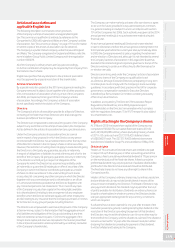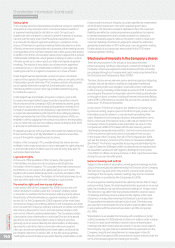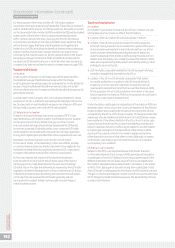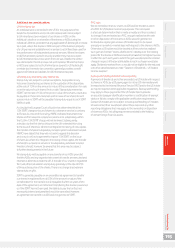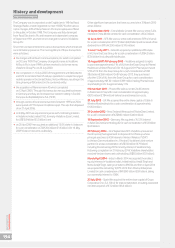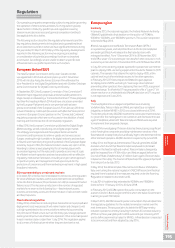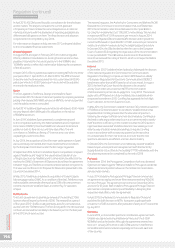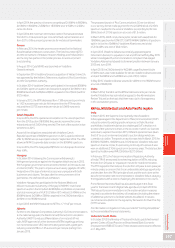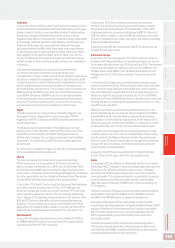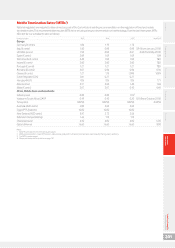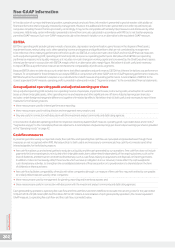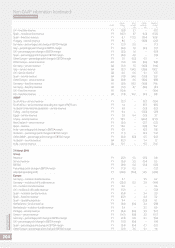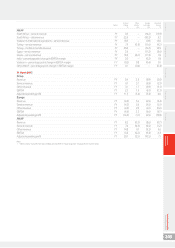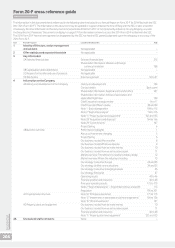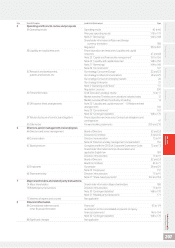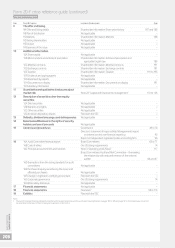Vodafone 2015 Annual Report Download - page 200
Download and view the complete annual report
Please find page 200 of the 2015 Vodafone annual report below. You can navigate through the pages in the report by either clicking on the pages listed below, or by using the keyword search tool below to find specific information within the annual report.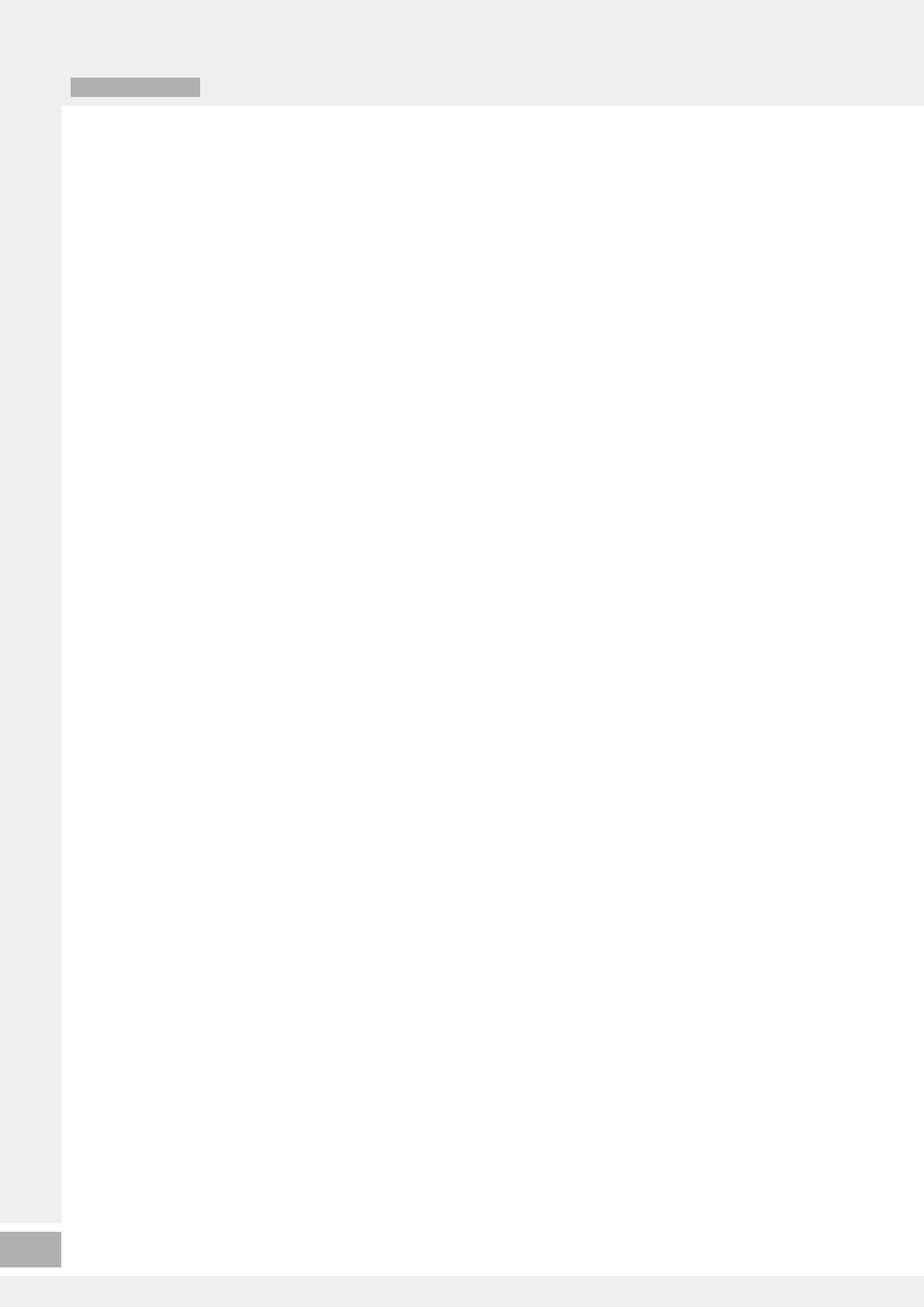
In October 2014, the Broad-based Black Economic Empowerment
Amendment Act, Act 46 of 2013 (the ‘BBB-EE Act’) came into force.
The trumping provision which enables the BBB-EE Act to take
precedence on all matters of BEE regulation, over any other sector-
specic legislations, is due to come into force on 1 October 2015.
The Independent Communication Authority of South Africa (‘ICASA’)
published their draft Radio Frequency Spectrum (‘RFS’) Regulations
in March 2015, determining the qualications for application and
transfer of RFS licences to be pegged at Level 4 under the BBB-EE Act
and BBB-EE Codes or 30% equity ownership in the hands of historically
disadvantaged persons (‘HDPs’) under the aegis of the Electronic
Communications Act.
In March 2014, the court ruled in favour of Vodacom and MTN in their
challenge to ICASA’s Call Termination Regulations (‘CTR’) decision
announced in February 2014. This led to ICASA initiating another
consultation process and in September 2014 they published the nal
CTR that reduces the rate to ZAR 0.13 cents per minute by October
2016. In December 2014, Cell C served ICASA (including other
interested parties such as Vodacom and MTN) with a notice of motion
in terms of which it is seeking an order for the review and setting aside
by the South Gauteng High Court, of the September 2014 CTRs.
Vodacom has led a notice to oppose Cell C’s application.
In May 2014, CompCom conrmed its intention to proceed with the
investigation into an allegation by Cell C that Vodacom and MTN have
abused their market dominance in contravention of Section 8 of the
Competition Act.
In May 2014, Vodacom entered into a sale agreement in terms of which
it would acquire 100% of the issued share capital and shareholders
loan and claims against Neotel. The transaction remains subject to the
fullment of a number of conditions precedent, foremost of which are
regulatory approvals by both ICASA and the Competition Commission
of South Africa (“CompCom”). All decisions are expected to be nalised
by the end of 2015.
In November 2014, the Ministry of Telecommunications and Postal
Services (‘DTPS’) published the National Integrated ICT Policy discussion
paper for comment that owed from the Green Paper published
for comment in January 2014. The key policy matters raised in the
aforesaid discussion paper include net neutrality, policy options for
the deployment of broadband infrastructure, and strengthening
of governance. This discussion paper will form the basis of a white paper
for communications policy in South Africa.
In March 2015, ICASA published their nal IMT Radio Frequency
Spectrum Assignment Plans (‘RFSAP’) determining that all spectrum
in 700MHz, 800MHz and 2.6GHz bands will be assigned by means
of an Invitation to Apply (‘ITA’) process. ICASA have not nalised the
assignment plans for the 850MHz band which specically deals with
Neotel’s assignment.
Vodacom: Democratic Republic of Congo
In January 2015, the National Intelligence Agency (‘ANR’) requested
all SMS and internet services to be suspended indenitely due
to political unrest and violence. Following signicant engagement
with the DRC government, SMS and internet services were re-opened
on 9 February 2015.
In February 2015, the national regulator, the Regulating Authority for
Post and Telecommunications (‘ARPTC’) issued regulations setting
the on-net voice price oor at US$5.10 cents per minute and off
net US$8.50 cents per minute from 1 March 2015 for 12 months,
suspended for three months pending the issue of new promotion
regulations. International promotions comprise voice retail rates; data
and SMS prices not included in the price oor, will be subject to a further
regulatory decision-making process.
In October 2014, in line with the glide path rates, MTRs were reduced
to US$3.40 cents per minute.
Vodacom: Tanzania
In July 2014, the Minister of Communications commenced
a consultation on draft regulations which requires all telecoms licencees
to list 35% of their local shareholding on the Dar Stock Exchange.
Vodacom Tanzania is participating in this consultation with other
industry operators.
Vodacom: Mozambique
In February 2015, the new Minister of Communications ordered all
operators to comply with subscriber registration requirements within
a 30 day period or unregistered subscribers will be disconnected.
Operators collectively have sought an extension and are participating
in a regulator-industry consultation process to determine a new
subscriber registration process.
International roaming in Africa
In November 2014, Southern African Development Community (‘SADC’)
Ministers of Communications met and set the National Regulatory
Authorities (‘NRAs’) a deadline of 31 March 2015 to implement
wholesale and retail three year glide paths based on the formula
recommended by SCF Associates’ report commissioned by the SADC.
In November 2014, East Africa Community (‘EAC’) Ministers
of Communications met and set the NRAs the deadline of 31 June
2015 to implement “Phase 1” price caps for wholesale (US$0.07 cents
per minute) and retail (US$0.10 cents per minute), and then a “Phase 2”
Single Area Network regulation, following a study to be commissioned.
Turkey
From July 2014, the Retail Price Cap for mobile-to-mobile and
mobile-to-xed voice termination was increased in line with the rate
of ination (5.3%) to 46.25 kr per second.
In August 2014, the national regulator, the Information and
Communications Technologies Authority (‘ICTA’) announced their
decision to broaden the scope of the 3G coverage obligation to include
the new metropolitan areas. Vodafone Turkey submitted a letter
of objection to the ICTA on the basis that their coverage commitment
is restricted to the original areas dened as metropolitan at the time the
agreement was signed. Vodafone Turkey has appealed against the ICTA
decision in the administrative court.
In August 2014, the Ministry of Transport, Maritime Affairs and
Communications of Turkey issued an amendment to the Rights
of Way Regulation, which reinforces the obligations of the incumbent
operator to respond to operators’ requests for access to their network
in a manner in line with the terms and conditions currently provided
within the Facility Sharing Obligation.
In September 2014, Clauses 126 and 127 of Basket Law No. 6552 were
passed, amending the Internet Law that grants the Presidency
of Telecommunication and Communication (‘TİB’) extensive powers
over internet use. With the new amendment, all internet trafc data will
be collected by TİB and the Head of TİB will be able to order closure
of a website on the basis of “preventing criminal acts, and securing
national security and public order”.
In October 2014, Law No. 6563, the Regulation of Electronic Commerce
(the ‘Law’) was passed and will come into force in May 2015. The law
includes protection of consumers against unsolicited SMS messaging
by introducing opt-in and opt-out requirements for electronic
communication services.
In March 2015, the Ministry announced the details for the 4G auction
planned in May 2015. The auction includes a total of 390MHz from
800MHz, 900MHz, 1800MHz, 2.1GHz and 2.6GHz spectrum bands.
One block will be reserved for a possible fourth operator on 2.6GHz
with, as yet, undisclosed limited obligations. Total reserve tender prices
exceed €2.0 billion.
Vodafone Group Plc
Annual Report 2015
198
Regulation (continued)
Unaudited information



